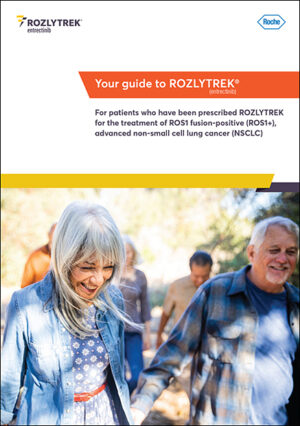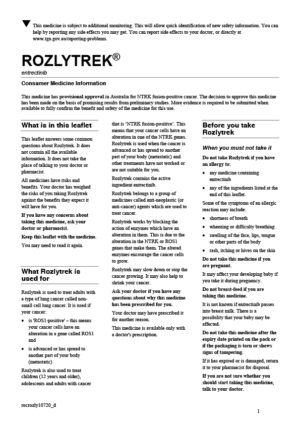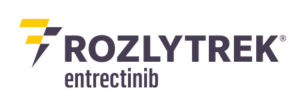ROZLYTREK®
(entrectinib)
Pronounced Roz-leee-treck
ROZLYTREK is a prescription medicine used to treat adults with ROS1+ non-small cell lung cancer (NSCLC), or with NTRK+ cancer. ROZLYTREK contains the active ingredient entrectinib. It belongs to a group of medicines called anti-neoplastic (or anti-cancer) agents which are used to treat cancer. It is a type of targeted therapy called a ‘TKI’ (tyrosine kinase inhibitor) – it is not a chemotherapy or an immunotherapy. It comes in the form of 200mg capsules and the recommended dosage for adults is three capsules once a day.
Have you been tested for ROS1+ NSCLC, or NTRK+ cancer?
To establish if an alteration in your ROS1 or NTRK genes are causing your lung cancer, your doctor needs to request a special type of test designed to look at the DNA in your tumour. If a ROS1 or NTRK gene fusion is detected, ROZLYTREK is likely to be a suitable treatment for your cancer.
Not all patients in New Zealand are tested for ROS1 or NTRK gene fusions.
If you’re not sure if you’ve had one of these tests, talk to your doctor who will be able to advise you.
Clinical trial data

In an analysis of people with advanced or metastatic ROS1+ NSCLC who received ROZLYTREK across three different clinical trials, it was found that 77% of people responded to the drug (ie, it caused their cancer to stabilise or shrink). They responded to this treatment for a median of 24.6 months. ROZLYTREK was able to control tumours that had spread to the brain in 55% of people.
In an analysis of people with advanced or metastatic NTRK+ solid tumours who received ROZLYTREK across three different clinical trials, it was found that 57% of people responded to the drug (ie, it caused their cancer to stabilise or shrink). They responded to this treatment for a median of 10 months. ROZLYTREK was able to control tumours that had spread to the brain in a number of people.
Keep in mind that everyone is different, and the response and benefit you may experience cannot be predicted. Ask your doctor about the clinical evidence for ROZLYTREK and if it is right for you.
Possible side effects of ROZLYTREK
All medicines can have side effects. You’ll find a list of possible side effects in the Consumer Medicines Information here.
Always talk to your doctor if you have any questions or concerns.
How to access ROZLYTREK
ROZLYTREK is not a PHARMAC funded medicine. This means you will have to pay for this medicine. Paying for treatment requires careful thought, but there are financial options and programmes that may help you fund private treatment. If you have health insurance, carefully check what’s covered — every health insurance provider has different rules and benefits that cover cancer treatment, surgery, tests and doctor appointments.
Roche also offers support through a Cost Share Programme, which is designed to help you pay for certain medicines (including ROZLYTREK) which are not funded by PHARMAC. Your doctor can provide you with further information regarding the criteria for enrolling into the ROZLYTREK Cost Share Programmes.
Ready to take the next step?
Because every situation is different, it’s important to speak to your doctor to find out if ROZLYTREK is right for you.
If you’re now considering treatment with ROZLYTREK
We’ve put together a discussion guide to help you begin a conversation with your doctor. Print it off, take it along to your next appointment, and take notes in the spaces provided.



